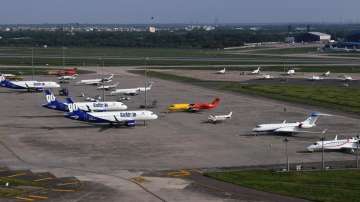India has been introduced to a state-of-the-art Central Command Centre for Air Traffic Flow Management (C-ATFM) that will help regulate air traffic at capacity-constrained Indian airports.
Civil Aviation Minister Hardeep Singh Puri on Saturday inaugurated C-ATFM in Delhi and said it was an "absolute necessity" to ensure higher standards of safety.
The C-ATFM or the central ATFM system is primarily meant to balance the "capacity against the demand to achieve optimum utilisation" of "airport, airspace and aircraft", the Airport Authority of India (AAI) said, in a statement.
HOW DOES IT WORK?
The central ATFM system integrates flight data from various subsystems like ATC Automation System, flight updates and flight update messages.
The system also displays weather information along with static information about airports, airspaces and air routes. The system processes the demand and capacity information and provides decision-making tools to the ATFM Flow Manager for collaborative decision making and to ensure regulated flow of traffic at each airport in India.
The central ATFM system aims to connect all airports in India. It has actively connected top 36 airports that are handling the traffic. These airports are physically connected to this network. The rest of the airports are connected through internet.
The C-ATFM system is supported by 36 Flow Management Positions (FMP) at various airports including Delhi, Mumbai, Chennai, Kolkata, Bengaluru and Hyderabad among others. Eight defence airports are also part of the ATFM network which are provided with FMPs.
"This is a world class system where on one large screen you can see all the civil aviation infrastructure in the country. The planes on the ground, the planes which are in the air, those planes you are in touch with - all of it is integrated with the air traffic control (ATC)," Hardeep Singh Puri said, after the inauguration.
WHY IS IT REQUIRED?
During peak air travel times, there are about 5,000 airplanes in the sky every hour. The task of ensuring safe operations of commercial and private aircraft falls on air traffic controllers.
These controllers must coordinate the movement of thousands of aircraft, keep them at safe distances from each other, and direct them during take-off and landing from airports.
The air traffic controllers also direct flights around bad weather and ensure that traffic flows smoothly with minimal delays.
WHAT'S SO GREAT?
India has now become the seventh country to have a centralised air traffic flow management system -- after the US, Europe, Australia, South Africa, Japan, Brazil.
The system should help ease up conditions at airports with maximum shortage of infrastructure.
"With the commissioning of the Central Command Centre of the Central Air Traffic Flow Management Complex, we have made a humble beginning today. With this facility, in the next five years, we will be comparable to what the best of the world have to offer," AAI chairman Guruprasad Mohapatra said.
WHAT DOES THE FUTURE HOLD?
The system will look on how to deal with the rising demand for slots and other resources at various airports across the country. The principle is fair distribution of slots and other available resources to everyone.
(with inputs from agencies)
